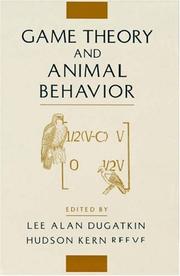| Listing 1 - 10 of 13 | << page >> |
Sort by
|
Book
ISBN: 9780691180472 9780691236247 9780691253893 0691253897 0691180474 Year: 2023 Publisher: Princeton, N.J. Princeton University Press
Abstract | Keywords | Export | Availability | Bookmark
 Loading...
Loading...Choose an application
- Reference Manager
- EndNote
- RefWorks (Direct export to RefWorks)
"A rich and surprising exploration of the intelligence of bees. Most of us are aware of the hive mind--the power of bees as an amazing collective. But do we know how uniquely intelligent bees are as individuals? In The Mind of a Bee, Lars Chittka draws from decades of research, including his own pioneering work, to argue that bees have remarkable cognitive abilities. He shows that they are profoundly smart, have distinct personalities, can recognize flowers and human faces, exhibit basic emotions, count, use simple tools, solve problems, and learn by observing others. They may even possess consciousness. Taking readers deep into the sensory world of bees, Chittka illustrates how bee brains are unparalleled in the animal kingdom in terms of how much sophisticated material is packed into their tiny nervous systems. He looks at their innate behaviors and the ways their evolution as foragers may have contributed to their keen spatial memory. Chittka also examines the psychological differences between bees and the ethical dilemmas that arise in conservation and laboratory settings because bees feel and think. Throughout, he touches on the fascinating history behind the study of bee behavior. Exploring an insect whose sensory experiences rival those of humans, The Mind of a Bee reveals the singular abilities of some of the world's most incredible creatures."
Bees --- Psychology. --- Behavior --- Animal psychology --- Animal psychology and neurophysiology --- Insects. Springtails
Book
ISBN: 9782021483086 2021483088 Year: 2023 Publisher: Paris : Seuil,
Abstract | Keywords | Export | Availability | Bookmark
 Loading...
Loading...Choose an application
- Reference Manager
- EndNote
- RefWorks (Direct export to RefWorks)
Au soir d'une vie consacrée à l'exploration de l'âme humaine, Freud affirme que ceux qu'il désigne comme "animaux supérieurs" , qui ont notamment connu une période de dépendance dans l'enfance, ont le même appareil psychique que l'homme. Cette affirmation est rendue possible grâce à une conception du psychisme plus profonde que celles qui lient inconscient et langage. Elle fait appel à l'histoire de l'évolution et pense une commune condition des êtres vivants, nés et mortels. Si Freud extrapole sa thèse de l'inconscient, du moi et du surmoi aux animaux supérieurs, ce n'est donc en rien par anthropomorphisme. Il s'agit plutôt d'un constat, désormais étayé par l'éthologie et la psychiatrie vétérinaire, qui décrivent des conflits intérieurs et traitent de psychopathologies. Par-delà la pleine reconnaissance d'une vie consciente, la prise en compte de l'inconscient des animaux renouvelle notre compréhension philosophique du psychisme, aussi bien humain que non-humain.
Animal psychology --- Animal psychopathology --- Psychoanalysis --- Inconscient. --- Animaux --- Psychologie. --- Freud, Sigmund, --- Critique et interprétation.
Book
Year: 2023 Publisher: Antwerp
Abstract | Keywords | Export | Availability | Bookmark
 Loading...
Loading...Choose an application
- Reference Manager
- EndNote
- RefWorks (Direct export to RefWorks)
Molecular biology --- Animal biochemistry --- Animal psychology and neurophysiology --- Animal embryology and growth --- Birds
Book
ISBN: 9780691198606 0691198608 9780691245737 Year: 2023 Publisher: Princeton, N.J. Princeton University Press
Abstract | Keywords | Export | Availability | Bookmark
 Loading...
Loading...Choose an application
- Reference Manager
- EndNote
- RefWorks (Direct export to RefWorks)
Nature is rife with cheating. Possums play possum, feigning death to cheat predators. Crows cry wolf to scare off rivals. Amphibians and reptiles are inveterate impostors. Even genes and cells cheat. The Liars of Nature and the Nature of Liars explores the evolution of cheating in the natural world, revealing how dishonesty has given rise to wondrous diversity. Blending cutting-edge science with a wealth of illuminating examples — from microscopic organisms to highly intelligent birds and mammals — Lixing Sun shows how cheating in nature relies on two basic rules. One is lying, by which cheaters exploit honest messages in communication signals and use them to serve their own interests. The other is deceiving, by which cheaters exploit the biases and loopholes in the sensory systems of other creatures. Sun demonstrates that cheating serves as a potent catalyst in the evolutionary arms race between the cheating and the cheated, resulting in a biological world teeming with complexity and beauty. Brimming with insight and humor, The Liars of Nature and the Nature of Liars also looks at the prevalence of cheating in human society, identifying the kinds of cheating that spur innovation and cultural vitality and laying down a blueprint for combatting malicious cheating such as fake news and disinformation
Book
ISBN: 9781541600850 9781541600867 Year: 2023 Publisher: New York, N.Y. Basic Books
Abstract | Keywords | Export | Availability | Bookmark
 Loading...
Loading...Choose an application
- Reference Manager
- EndNote
- RefWorks (Direct export to RefWorks)
Book
ISBN: 1280442212 9786610442218 1423764927 0195358805 1601299559 9781423764922 9781601299550 9780195086218 019508621X 9780195086225 0195086228 0195086628 0197700640 Year: 2023 Publisher: New York : Oxford University Press,
Abstract | Keywords | Export | Availability | Bookmark
 Loading...
Loading...Choose an application
- Reference Manager
- EndNote
- RefWorks (Direct export to RefWorks)
Animal behavior. --- Cooperativeness. --- Cooperation (Psychology) --- Social psychology --- Animals --- Animals, Habits and behavior of --- Behavior, Animal --- Ethology --- Animal psychology --- Zoology --- Ethologists --- Psychology, Comparative --- Behavior

ISBN: 1280761067 9786610761067 0198028628 9780198028628 9781280761065 9780195122671 0195122674 9780195122664 0195122674 0195122666 019770073X Year: 2023 Publisher: New York, N.Y. ; Oxford University Press,
Abstract | Keywords | Export | Availability | Bookmark
 Loading...
Loading...Choose an application
- Reference Manager
- EndNote
- RefWorks (Direct export to RefWorks)
This is an introduction to a set of powerful and extremely flexible modelling techniques, starting at square one and continuing with chosen applications.
Animal behavior --- Animal ecology --- Animals --- Zoology --- Ecology --- Animals, Habits and behavior of --- Behavior, Animal --- Ethology --- Animal psychology --- Ethologists --- Psychology, Comparative --- Mathematical models. --- Behavior
Book
ISBN: 9786610831210 1280831219 0198026021 9780198026020 0190284587 0197701280 Year: 2023 Publisher: New York ; Oxford University Press,
Abstract | Keywords | Export | Availability | Bookmark
 Loading...
Loading...Choose an application
- Reference Manager
- EndNote
- RefWorks (Direct export to RefWorks)
The handicap principle is that signals are only taken seriously if the signal itself imposes a handicap on the signaller that would make cheating impossible or unprofitable. The Zahavis explore the wide-ranging implications of this theory.
Animal behavior. --- Animal communication. --- Animals --- Animals, Habits and behavior of --- Behavior, Animal --- Ethology --- Animal psychology --- Zoology --- Ethologists --- Psychology, Comparative --- Animal biocommunication --- Animal language --- Biocommunication, Animal --- Language learning by animals --- Animal behavior --- Behavior
Book
ISBN: 3031360923 3031360915 Year: 2023 Publisher: Cham : Springer Nature Switzerland : Imprint: Palgrave Macmillan,
Abstract | Keywords | Export | Availability | Bookmark
 Loading...
Loading...Choose an application
- Reference Manager
- EndNote
- RefWorks (Direct export to RefWorks)
“For those getting a bit bored with the endless stream of micro-criminological studies with little ideological bearing, this well-researched book is an unexpected treat. Pushing the limits of criminology’s interdisciplinarity tradition, it outlines how Homo sapiens as an intrinsically criminal species is bound to extinct itself and life on Earth as we know it. The stakes are nothing less than the prevention of the Apocalypse.” -Jan van Dijk, winner of the Stockholm Prize in Criminology 2012 The book sketches out how the criminological lens could be used in the climate change debate around possible human extinction. It explores the extent to which the human species can be considered deviant in relation to other species of the contemporary biosphere, as humans seem to be the only species on Earth that does not live in natural balance with their environment (anymore). It discusses several unsettling topics in the public debate on climate change, specifically the taboo of how humans may not survive the ongoing climate change. It includes chapters on the Earth’s history of mass-extinctions, the global state of denial including toward the possibility that the human species could go extinct, and it considers humans' future as a deviant, fatal species outside of Earth, in outer-space, possibly on other planets. It puts forward and enriches the critical criminological tradition by conceptualizing and setting an unsettling tone within criminology and criminological research on the human species and our extinction, by daring criminologists (and victimologists) to ponder and seek empirical answers to controversial imaginations and questions about our possible extinction. Yarin Eski is Assistant Professor in Public Administration and Co-Director of the Resilience, Security & Civil Unrest (ReSCU) R&I Lab at the Vrije Universiteit (VU), Amsterdam. He obtained his PhD from the University of Glasgow in 2015 and previously lectured at Liverpool John Moores University, UK. Yarin is Fellow of the Higher Education Academy in the United Kingdom.
Critical criminology. --- Environmental sciences—Social aspects. --- Victims of crimes. --- Bioclimatology. --- Psychology, Comparative. --- Critical Criminology. --- Environmental Social Sciences. --- Victimology. --- Climate Change Ecology. --- Cross-species Comparison. --- Behavior, Comparative --- Comparative behavior --- Comparative psychology --- Ethology, Comparative --- Intelligence of animals --- Zoology --- Animal behavior --- Animal intelligence --- Animal psychology --- Human behavior --- Instinct --- Bioclimatics --- Biometeorology --- Climatology --- Ecology --- Crime victims --- Victimology --- Victims --- Radical criminology --- Criminology

ISBN: 1280480890 019802570X 9786610480890 1423738810 0195350200 1602564248 9781423738817 9781280480898 9780198025702 9781602564244 0195137906 0195096924 0197701167 Year: 2023 Publisher: New York ; Oxford University Press,
Abstract | Keywords | Export | Availability | Bookmark
 Loading...
Loading...Choose an application
- Reference Manager
- EndNote
- RefWorks (Direct export to RefWorks)
Game theory has reshaped the study of animal behaviour. With this book, the editors present an overview of game theory models, their uses, and their strengths and weaknesses.
Animal behavior --- Game theory. --- Games, Theory of --- Theory of games --- Mathematical models --- Mathematics --- Animals --- Animals, Habits and behavior of --- Behavior, Animal --- Ethology --- Animal psychology --- Zoology --- Ethologists --- Psychology, Comparative --- Mathematical models. --- Behavior --- 591.5 --- 519.8 --- 330.1 --- -Game theory --- 330.1 Economische grondbegrippen. Algemene begrippen in de economie --- Economische grondbegrippen. Algemene begrippen in de economie --- 519.8 Operational research --- Operational research --- 591.5 Animal habits. Animal behaviour. Ecology. Ethology. Animal and environment. Bionomy --- Animal habits. Animal behaviour. Ecology. Ethology. Animal and environment. Bionomy
| Listing 1 - 10 of 13 | << page >> |
Sort by
|

 Search
Search Feedback
Feedback About UniCat
About UniCat  Help
Help News
News